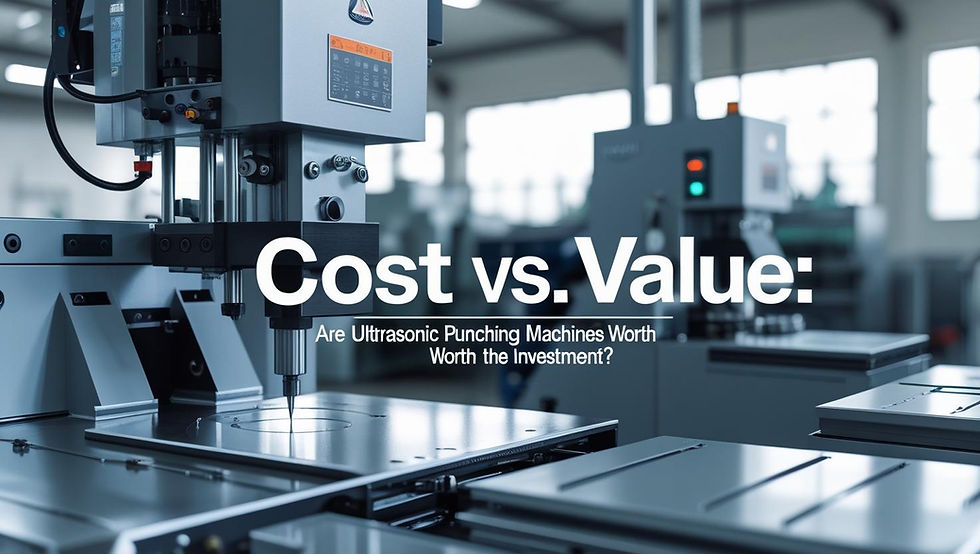How to Start an Ultrasonic Product Business (2025 Guide)
- ztzgsteeltech
- May 22
- 5 min read

Starting an ultrasonic product business might sound like a big leap, but once I dove into the details, I realized it’s more approachable than I thought. Whether you're into tech, manufacturing, or just want to sell products that solve real problems, ultrasonic machines offer a great opportunity.
In this guide, I’ll walk you through everything I learned when exploring how to start an ultrasonic product business—from understanding the market to choosing suppliers and getting customers.
Understanding the Ultrasonic Product Industry
Before I got into this space, I didn’t realize how many industries rely on ultrasonic technology. From cleaning surgical instruments to welding plastic components and even cutting fabric without fraying, ultrasonic machines are everywhere.
There are four main product categories:
Ultrasonic cleaners
Ultrasonic diagnostic or testing tools
Each type serves a different need. For example, ultrasonic cleaners are popular in hospitals and automotive shops, while ultrasonic sewing machines are a big deal in the textile industry.
What really got my attention was the market growth. In 2025, this sector is still on the rise. Businesses want fast, clean, and efficient solutions, and ultrasonic systems check all the boxes. It’s also a cleaner alternative to traditional mechanical methods, which makes it attractive for companies trying to reduce waste and improve precision.
Picking a Business Model That Fits
I quickly realized there’s more than one way to get into this space. Depending on your budget and skill set, you can choose a model that works best for you:
1. Manufacturing
If you have an engineering background or a solid technical team, you might consider designing and building your own ultrasonic equipment. It’s a big investment upfront, but it gives you full control over product quality.
2. Reselling or Distribution
This was my first serious consideration. You don’t need to make the machines—you just sell them. Many ultrasonic equipment manufacturers offer distributorships or wholesale pricing if you can move volume. You can even private-label some models.
3. Service Business
Offering ultrasonic cleaning or welding as a service works well locally. You can start small with a few machines and grow from there. Think jewelry cleaning, car parts restoration, or even fabric edge-sealing for small businesses.
4. Consulting or Custom Solutions
If you're technically inclined, you can offer tailored solutions to factories or businesses with unique needs. Some companies want machines customized for their materials, which is a great niche to serve.
Building a Solid Business Plan
I didn’t want to dive in without a plan. Here's how I broke it down:
Market Research
I started by identifying who needs these machines. Textile manufacturers, medical labs, electronics factories, and even small repair shops came up. Then I looked at local and online competitors to figure out pricing, customer pain points, and gaps I could fill.
Branding and Positioning
A clear business name and identity helped me stay focused. I aimed for something that signals precision and reliability. Branding matters, especially when you're building trust in a technical field.
Legal Setup and Compliance
Depending on your region, you’ll need to register your business, get a tax ID, and check any import/export or electrical certification rules. If you’re selling to the medical field, you’ll need to meet certain compliance standards.
Budgeting and Forecasting
I calculated my startup costs, including initial inventory, marketing, website setup, and any warehouse or workspace. It helped me see how many sales I’d need each month to cover costs and make a profit.
Finding the Right Ultrasonic Product Supplier
Once I chose to start as a reseller, the next step was finding the right supplier. I wasn’t just looking for cheap prices—I wanted a supplier that offered reliable machines and decent support.
Here’s what I looked for:
Product range (do they offer the types I want to sell?)
Tech support and training
Warranty and spare parts
Customization or branding options
One standout for me was ZrinTech. They’re known for their ultrasonic sewing and fabric cutting machines and work closely with startups. Their machines are well-built and they offer custom solutions based on your market.
Other reliable suppliers I explored:
Omegasonics – for industrial cleaning systems
SharperTek – affordable ultrasonic cleaners
RPS-Sonic – ultrasonic welding tools
Whether you go with local or international suppliers, be sure to ask for sample units, tech specs, and shipping details. You want to make sure the machines are up to standard before you invest.
Setting Up Your Operations
Your business setup depends on your model. For reselling, I started with a small inventory and used a corner of my garage as a workspace. If you’re offering services, you’ll need a clean, accessible area with room for your machines and clients.
Equipment & Tools
Even if you’re not manufacturing, you’ll still need tools to test machines, handle packaging, or perform demos. For service-based models, get the right safety gear and power setup for the equipment.
Hiring Help
I started solo, but depending on your growth plan, you may need help with sales, repairs, or installations. Train your team well, especially if they’ll be using the machines hands-on.
Software and Admin Tools
I use a basic CRM to track leads and customer orders. Inventory tools helped me stay on top of stock, and having a clean, fast-loading website helped with credibility.
Attracting Customers and Growing Sales
Getting the right machines is only half the job. Now you need to find customers.
Website and SEO
I built a simple website with product pages, service info, and clear contact forms. I used keywords like “ultrasonic sewing machine supplier” and “ultrasonic welding service near me.” Blog posts also helped me get organic traffic.
Local Outreach
For service work, I visited local auto repair shops, textile factories, and medical centers. A quick demo and business card helped spark interest.
Trade Shows and Industry Events
Attending trade expos was great for networking and seeing what competitors offered. It also helped me understand customer pain points firsthand.
Social Media and Email
I kept it simple—sharing success stories, client results, and machine features. Email helped with follow-ups and offering seasonal discounts.
Pricing Strategy
Instead of undercutting everyone, I focused on value. That meant offering good support, fast response times, and small freebies like maintenance checklists or how-to guides.
Handling Logistics and Scaling Up
Shipping these machines can get tricky. I worked with a local courier for small items and partnered with a freight company for larger machines. Make sure everything is packed securely and clearly labeled.
I also offered basic user training and maintenance guides to reduce post-sale questions.
When sales picked up, I added new models to my store and began offering service packages.
For example, I offered an annual cleaning system tune-up for businesses using ultrasonic equipment.
Automation tools, like scheduled emails and inventory alerts, helped me manage more with less effort.
Common Challenges (and How I Handled Them)
I ran into a few bumps:
Tech issues with machines – I kept spare parts handy and worked with suppliers who offered remote diagnostics.
Explaining value to customers – Some clients didn’t get why ultrasonic was better. I created simple videos and demos that showed the difference.
Cash flow – I didn’t go overboard on inventory. I kept things lean and scaled only when I had regular sales.
Final Thoughts
Starting an ultrasonic product business isn’t just about machines—it’s about solving real-world problems in a smart, efficient way. I began small, tested what worked, and built relationships with people who needed what I offered.
If I had to start again, I’d still focus on finding a trusted ultrasonic product supplier like ZrinTech, building a lean setup, and going all-in on customer value.
If you're thinking about getting into this business, take the first step: research your niche, pick a model that fits, and start small. You’ll learn quickly, and with the right strategy, you can grow into a solid operation.



Comments